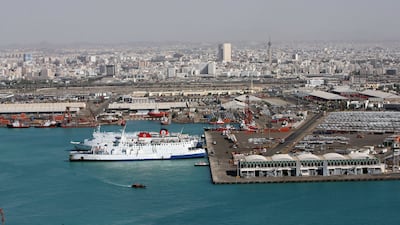Investments in Saudi Arabia’s industrial sector jumped 281 per cent over the past year to 20.5 billion riyals ($5.46bn), fuelling higher demand for warehouses and other units, according to a report.
This helped to create 30,000 jobs across the kingdom, consultancy Knight Frank said in its Saudi Arabia Industrial Market Review on Sunday.
“While the government’s economic initiatives have been a catalyst for the growth in the industrial sector, the pandemic has played an equally significant role,” said Faisal Durrani, partner and head of Middle East research at Knight Frank.
“The shift to online shopping has driven a surge in requirements for modern distribution facilities, built to international specifications, which remain in very short supply.”
Saudi Arabia has made a strong recovery from the coronavirus-induced slowdown that tipped the global economy into its deepest recession last year since the 1930s.
The country's economy is expected to grow 2.8 per cent this year, after shrinking 4.1 per cent last year, driven by higher oil prices and investment from its sovereign wealth fund, according to the International Monetary Fund.
Knight Frank expects the online shopping trend to continue throughout the year, fuelling further demand for industrial warehouses.
“We do not expect a let-up in online shopping and, indeed, the government forecasts revenue for the sector to close in on 30bn riyals this year, up from 24.7bn in 2020,” Mr Durrani said.
The growth in the kingdom's industrial sector is also supported by initiatives led by the Saudi Authority for Industrial Cities and Technology Zones, better known as Modon.
Apart from developing and managing 36 industrial cities around the kingdom, spread across more than 20,000 hectares of developed land, Modon has started to offer new products and services, such as ready warehouses, self-storage units and financing solutions to small and medium enterprises and entrepreneurs, including "plug and play" factories.
Lease rates and occupancy levels in both Riyadh and Jeddah have surged on the back of higher demand for industrial units, the report said.
In Riyadh, rents increased by about 7 per cent over the past 12 months and currently stand at about 130 riyals per square metre.
Rents in Jeddah rose by 4.5 per cent over the same period, with better quality space fetching as much as 310 riyals per square metre.
“With occupancy levels in Riyadh at 92 per cent and Jeddah at 87 per cent, both up two percentages points on last year, we expect upward rental pressure to persist,” said Mr Durrani.
“Riyadh, in particular, is expected to outperform Jeddah as stock levels have remained unchanged so far this year.”
The Saudi government has named the industrial and logistics sector as one of the key components in its push for economic diversification.
The kingdom has ambitious plans to develop its manufacturing capabilities and transform itself into a global logistics centre.
It unveiled the National Industrial Development Logistic Programme to boost the industrial and logistics sectors in the kingdom, offering incentives such as financing and infrastructure development.
It is also looking to improve soft infrastructure such as research, innovation and training to make it easier to do business in the kingdom.


